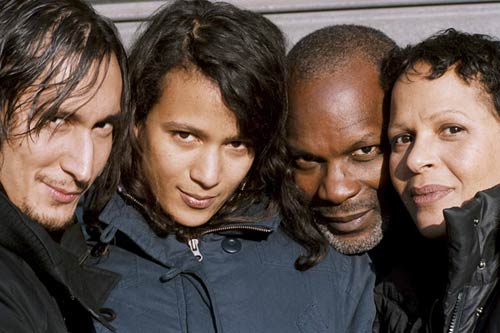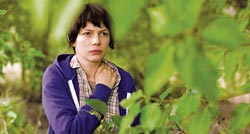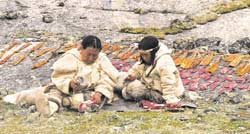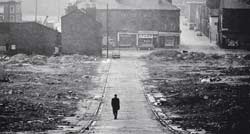
Claire Denis’s 35 Shots of Rum is one of those films that I hesitate to say too much about for fear of breaking the spell. It’s a marvelous story of a father, a daughter, and ... I don’t know. Friends. Lovers. Co-workers. It’s about a place. It’s about growing old. Falling in love. Family, both the blood kind and the neighborly ones. It’s about Life. That may be a cliche with some movies but not this one.
The story is obliquely told, Denis assuming that we can keep up, that the actors are good enough to convey with just small glances and smiles what we need to know. Of course they are. This creates moments of incredible beauty and power, as it dawns on us what’s about to happen or maybe what happened twenty years before, as we fully understand what we only partly guessed.
Understanding. Another theme that enriches what is already a rich, rich film. Rob has already hinted at a certain film allusion, Girish pointed out another during a post-movie lunch. I’ll let them reveal, like the movie, in their own sweet time. Or maybe you’ll want to discover for youself when you get a chance. I hope you do.
Oh, one last thing. “Nightshift†by the Commodores. Dancing and all that it implies, a language completely unto itself which Denis gracefully portrays. Agnes Godard’s lovely cinematography. Music by Tindersticks and songs perfectly chosen. Some familiar, some new. Trains, hearkening back to films from the very beginning and yet different here with the focus not only on movement but the people inside. People, dark-skinned people by the way but why would that stop you? People in their apartments. What are their lives like?--an ongoing question in a dark theater, translated hopefully to the outside world as we overcome our inherent narcissism. I guess that’s more than one last thing. 35 Shots inspires that kind of reflection, that kind of reverie. Reverie. Hmm.
There’s only one way to follow up a film like that, and that’s with lunch and good friends. One of my favorite places is the lunch buffet at Little India, and joining me are Girish, Darren, Andrew Proczek (from Toronto) and Danny Kasman from The Auteurs’ Notebook. We talk about the Denis when Danny’s not around, as he hasn’t seen it yet. But it’s mostly just warm conversation and equally enjoyable food. Claire Denis would approve.
While many critics are hailing Wendy and Lucy as one of the year’s best, I was a bit underwhelmed. Not that Michelle Williams isn’t marvelous as Wendy, a young woman trying to strike out on her own with her beloved dog. Nor is Kelly Reichardt’s direction lacking, as she beautifully captures the sadness and incipient despair in both Williams’s face and the small Oregon town in which Wendy finds (or loses) herself.
Rather, it’s the film’s modesty that leaves me wanting. It’s so minimalist in its portrait of this young woman that I found it difficult to connect with her. Why has she left her home of Indiana, and why does she think Alaska is the solution? The film makes no attempt to answer those questions; only a bit of family trouble, but that goes without saying. With no backstory and no inter-personal relationships to speak of (the titular dog is off-screen for most of the movie), we just watch Wendy struggle. I’m usually a big fan of stories that focus on the poor and downtrodden, but I couldn’t connect this time, leaving me admiring and even liking Wendy and Lucy, but unable to embrace it.
Admiration is all I can feel for James Benning’s RR. A two-hour experimental feature (well 115 minutes, but who’s counting?), it too has been loved by many critics I like and respect, and I can understand why. Benning has an incredible formal eye, able to place his 16mm camera in the absolute perfect spot and capture the landscape. In this case, the landscape is dominated by passing trains, with each shot starting as a train enters the frame and stopping as it leaves.
Benning’s compositions are often striking and beautiful, as he varies how the train and landscape interact. Sometimes, the train is huge, other times it’s off in the distance, and the background varies from small towns to mountains to fields. He also has an amazing way of recording the noise of the train, which obliterates the ambient sounds around, though Benning sometimes subverts that by including various audio clips of a baseball game, a church choir, and even Eisenhower’s famous “military-industrial complex†speech.
The primary theme of the film is the environment and how man’s industry has dominated and bespoiled it. One amazing shot involves the black smoke of a train’s exhaust settling across a beautiful mountain-sea landscape. In this way, the movie reminds me of Richard Misrach’s incredible color photographs of the desert southwest.
So what’s not to like about RR? Well, it’s two hours. And as my friend Garth pointedly put it, his tolerance for pictures and sounds of trains is significantly less than that. Me too, unfortunately. As much as I was enjoying the scenery, I started to get bored. There wasn’t enough variety in the shots to hold my interest, and I started wondering why Benning couldn’t have eliminated several of them and made a sleeker movie. I realize this makes me sound like a philistine to my avant-garde-loving friends, but oh well.
Before Tomorrow is one of those movies film festivals particularly like. It’s a well-meaning narrative about an unfortunately ignored tribe of people that tries to tell their stories. In this case, that’s the Inuits of the Arctic. Made by the same group that created the wonderful Atanarjuat The Fast Runner, this is a smaller film that focuses on an old woman and her grandson. They’ve left the larger tribe to go dry fish on an island. There the grandmother tells stories, and the boy takes his first steps towards manhood.
For about an hour, I was thoroughly engaged. Madeline Piujuq Ivalu, who co-directed and co-wrote the screenplay, is wonderful as the grandmother, conveying the pride she feels in both her grandson and the tribe’s traditions she’s eager to pass on. The cinematography takes advantage of the Arctic light, creating images of stark beauty, and the scenes with the tribe as a whole are enjoyable in the way ethnographic movies can be. I also appreciated the sense of place that’s created through the landscape and storytelling.
Unfortunately, Before Tomorrow’s last half hour loses all momentum. Restricted mostly to a cave, it attempts to show the difficulty of winters in the Arctic, but there’s a difference between portraying boredom and producing boredom, and this film unfortunately veers to the latter. It doesn’t help that the movie is bookended by an insipid folk song by the otherwise inspiring duo of Kate and Ann McGarrigle. “Why must we die?†it repeats over and over again, pounding in our head the movie’s banal message. It might work for many festivalgoers, but not for this one.
Terence Davies has a message or two in his latest work, Of Time and the City, but they’re conveyed with such poetry and humor that I was happy to swallow even the most strident discourse. It’s an essay film that looks back at his native Liverpool. “We love the place we hate,†Davies intones, and that vast ambivalence undergirds all 77 minutes.
What I love about the movie is how Davies shows the character of the city in which he grew up. Though Liverpool after World War II was hardly a paradise, Davies chooses footage that captures the intimacy of the old streets, the energy of the public beaches and soccer stadiums, the nostalgia for things like beauty pageants and schoolyard songs. Speaking of songs, many of the images are accompanied by luminous musical choices: classical music by Handel and Mahler, old songs by Peggy Lee or The Spinners. Here, The Spinners’ version of “Dirty Old Town†becomes a defiant love song to Davies’s childhood years.
When he’s not playing music, he's quoting T.S. Eliot, Chekhov, and the Bible. That poetry, combined with his rich bass voice, has a melody all its own. Some of that narration has a caustic edge to it, as Davies thunders against the monarchy and the Church--angry at the former for its empty rituals, at the latter for, well, the same thing. Davies has the fury of a man who prayed to hear God’s voice and received only silence.
Still, Of Time and the City revolves around Liverpool, and for that Davies has much affection. The movie has the playfulness, if not the rigor, of a Chris Marker film. And though its conclusion doesn’t have the power of its first two-thirds, maybe that’s a metaphor for Liverpool itself.
Things finally slow down tomorrow, as I recognize the importance of walking in the sun. Fortunately there are a few movies, too.








35 Shots of Rum is a film that--early on in the festival--impressed me a lot because I wanted it to impress me a lot. But as the festival wore on, by comparison to other films, and now in the days following my return home, it has left me somewhat hungry, the way you're hungry an hour or two after eating Chinese take-out. Susan Oxtoby and I discussed the film in the airport while waiting for our flight home and I think she said it best: "Denis can do better." It's a solid film, I would certainly recommend it, but it has lost its allure in too short of a time.
J. Robert, I've been interested to hear you, Darren, and Girish qualify Benning's RR as a "masterpiece" and wonder how much savvy about avante-garde cinema would be required to make such a statement? Notwithstanding, I look forward to catching it next week when it screens at PFA as part of their Alternate Visions program. I recall attending a program of experimental shorts with Darren at our San Francisco International that was a grueling exercise in keeping awake. Whatever blows your skirt up, I guess.
Terence Davies was recently in the Bay Area for a mini-retrospective at PFA and I certainly appreciated the opportunity to watch his films and hear him speak. During the shot-by-shot, his commentary--judging from ample reviews I've read of Of Time and the City--closely tracked with that film's narrative voiceover, so I have a sense that it was wise for me to hold off on seeing this, since I've already heard most of what he's going to say. By the time it finally arrives theatrically, I'll probably be ready for it.